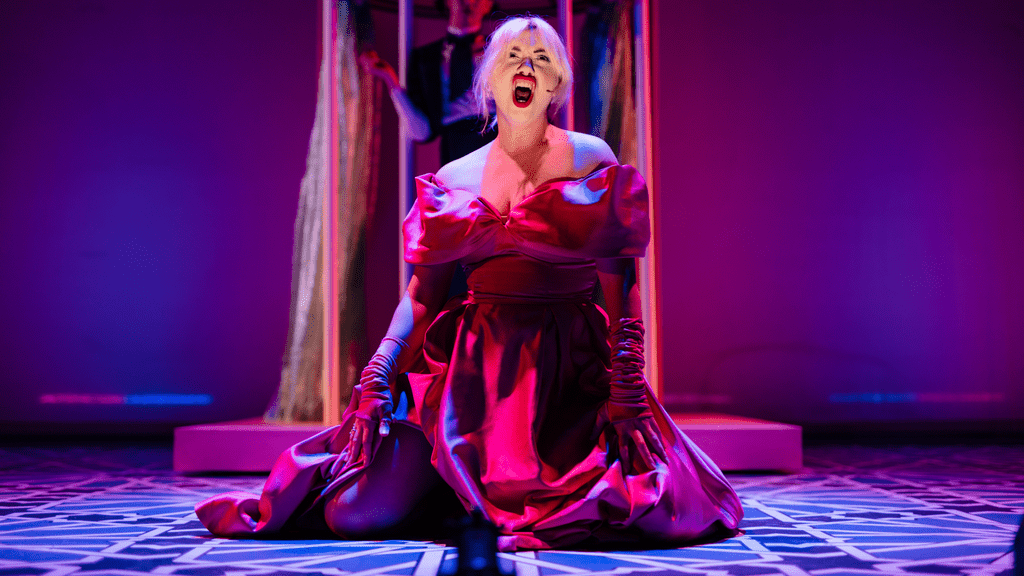Womanhood in Modest & School Girls; Or, The African Mean Girls Play
There are two plays running concurrently at the moment which have very different subject-matters – the story of artist Elizabeth Thompson, the first woman in 1879 to *almost* be elected into the Royal Academy as an Associate Member; and the story of six schoolgirls all auditioning to be Miss Ghana in 1986. Despite that, I want to take a moment to respond to both plays’ discussions about ‘womanhood’.
Modest, Kiln Theatre

Modest paints the rise and fall of Elizabeth Thompson in brash and resonant strokes and shades, with many a musical number. By way of brief recap, Elizabeth Thompson’s first submission to the RA is selected to hang in the most prominent position in Gallery Two. Her painting quickly elevates her to celebrity status, even getting the attention of Queen Victoria. However, the liberally misogynistic RA men are reluctant to vote her into the Academy. As quickly as she comes into favour, her reputation soon declines. In the play, we’re never shown Elizabeth’s military paintings – we can only imagine their masculine austerity, which stands at odds with the uber-feminine depiction of Elizabeth we are shown. With Terry Herfield’s brilliant costume design, Emer Dinnen as Elizabeth stuns in her floor-length pink ball gown.
And for all that stylishness, Elizabeth rejects the idea of ‘womanhood’. Her sister, Alice (played by Fizz Sinclair) who too yearns to be elected Poet Laureate (an honour up-to-now only awarded to men), wants Elizabeth to use her fame to bring attention to the suffragette movement. But although Elizabeth has played to the tune of a ‘demure polite lady’ to get to where she is now, she doesn’t actually care about the advancement of women in Victorian society. Even though Alice and Elizabeth are diametrically opposed in their politics, there’s a striking moment when Elizabeth, after losing associate RA membership by two votes, hands a top hat (which in the play signifies when the ensemble are playing the parts of the RA men) to Alice; however, Alice would much rather stay as a woman and grieve with her sister than ‘turn into a man’ – even though the men are jubilant, drinking champagne and celebrating their successful blocking of a woman into their close circles. This, to me, is womanhood, encapsulated so powerfully through the fluidity of the costuming – solidarity with those who experience similar lots in life due to gendered marginalisation and violence.
School Girls; Or, The African Mean Girls Play, Lyric Hammersmith Theatre

At the heart of the rapid-fire comedy in School Girls, is a discussion of womanhood as it relates to desirability. Maybe there isn’t the same historical stakes for Paulina, the Regina George analogue in School Girls, (played by the magnetic Tara Tijani); the first Black woman won Miss Universe in 1977, only 9 years prior to the events in School Girls. Nonetheless, Paulina puts a lot on winning Miss Ghana. All she wants to do is escape the poverty of her village and the colorism of her mother (who reminds her constantly she’s the darkest-skinned person in their family), and so her only desire is to win the respect of those whose opinions count in the West, i.e. the recruiter. At the beginning of the play, Paulina believes she’s a shoe-in to win; she commands the stage of the Lyric Hammersmith, boasting about her relatives who live in America and buy her clothes from Chinatown and White Castle, which she believes to be the upper echelon of fashion and status. However, when new girl Ericka arrives (a white girl who pretends she’s of Ghanaian heritage), she tells Paulina’s sycophants that White Castle and Chinatown are home to cheap knock-offs. After this revelation, we see Paulina get ousted pretty quickly from the social group she’s fought so hard to mould, as they all begin to fawn over Ericka – who has everything Paulina wants.
Alison A Addo plays the schoolgirls’ Headmistress Francis, who tries to champion Paulina as the Miss Ghana forerunner; she knows how much this could help Paulina’s self-esteem, who she’s had to take to hospital countless times from implications of her skin-bleaching. The headmistress, like Alice in MODEST, operates under the assumption that once Paulina wins Miss Universe, she’ll be the best poster-child to convince others to change the system. However, the recruiter wants to pick Ericka, who, on account of her whiteness, is deemed to be a surefire ticket to winning Miss Universe. Her reasoning here epitomises desirability politics – why go against the system when you can play it and win? In a pageant, gender automatically becomes a competition. But race becomes a factor that means not all women can play on a level playing field. And with that in mind, when you’re at the very bottom, there is an urgent need to stand out but also blend in to be the ‘right kind’ of woman. But try as Paulina might, race isn’t something fluid, no matter how much bleaching cream you use.
However, at the root of all this (no spoilers) is a western heteropatriarchal system who ultimately decides who the top ten most beautiful women in the world are – not the headmistress, not the recruiter, not Paulina. No matter how deferential, modest, or ladylike Elizabeth and Paulina are, their gender and race, respectively, preclude them from winning in a society with immutable definitions of ‘womanhood’. And for Black women, everything in your life is gendered and racialized, whether you like it or not.
